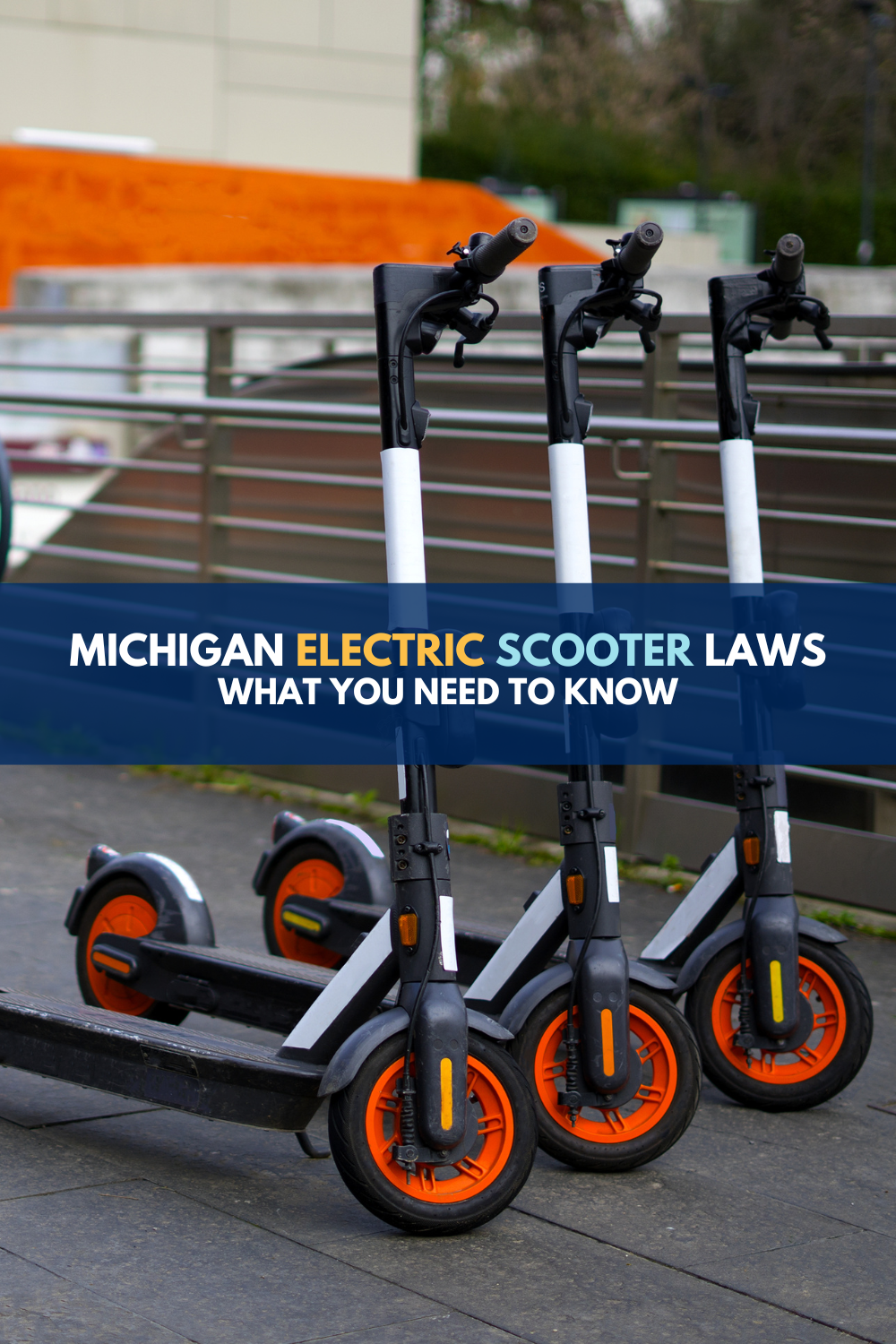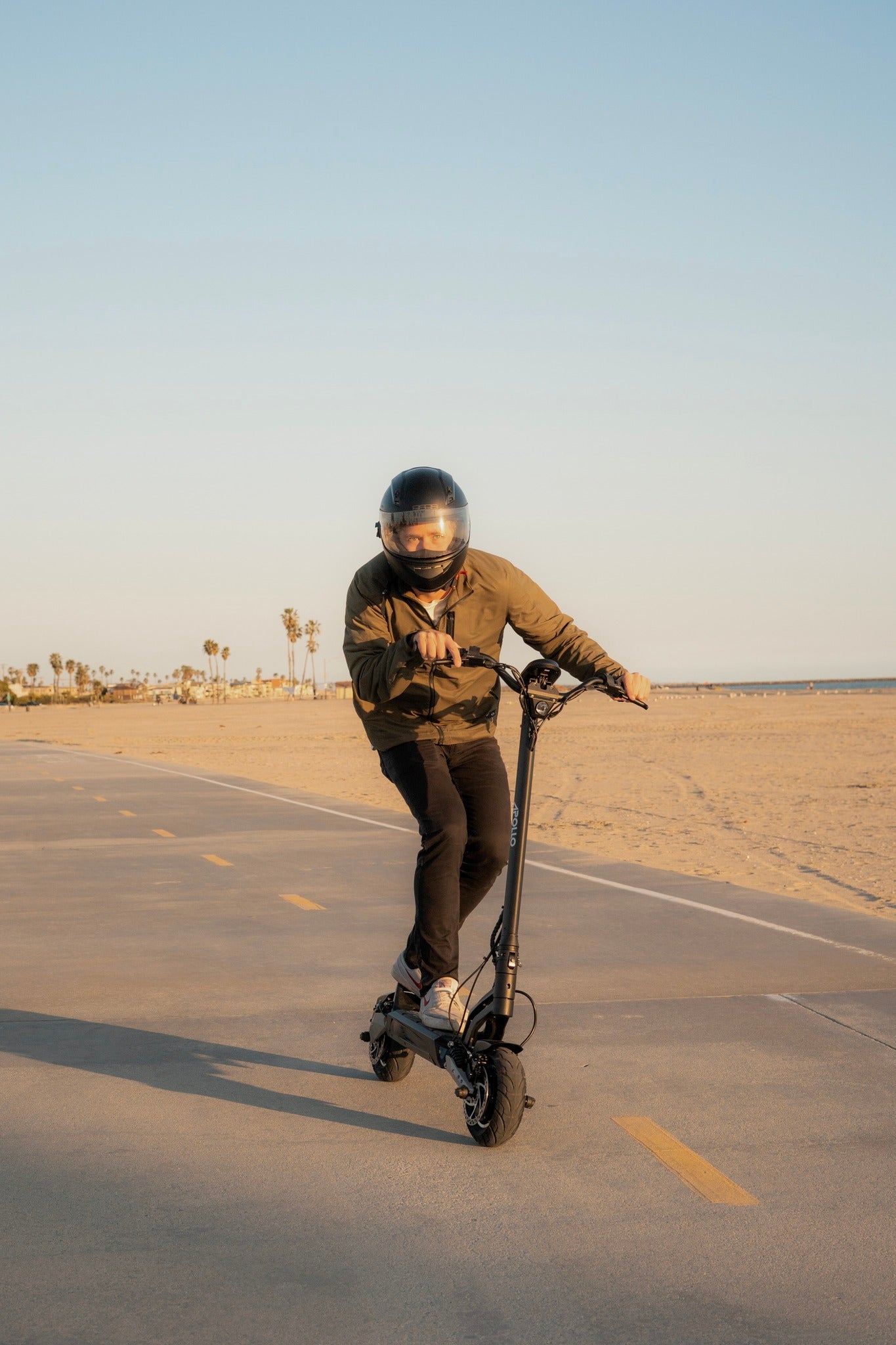Scooters must meet certain legal requirements to be considered street legal, which vary by jurisdiction. In some areas, scooters may need to have specific safety features, such as headlights, taillights, turn signals, mirrors, and a speedometer.
Additionally, scooters may need to meet certain engine displacement, weight, and speed restrictions. It is important to check the local laws and regulations for your area to ensure your scooter meets all the necessary requirements before riding it on public roads.
Scooters have become a popular mode of transportation in urban areas due to their convenience and eco-friendly nature. However, to legally operate a scooter on the streets, it must meet certain requirements prescribed by local laws and regulations. These requirements may vary depending on the jurisdiction, but commonly include safety features and performance limitations.
Ensuring that your scooter is street legal not only ensures your safety but also helps you avoid potential fines or legal issues. We will explore the necessary criteria that scooters must meet to be considered street legal, providing you with a comprehensive understanding of the legal requirements you need to comply with before taking your scooter out on the road.

Credit: www.lawfirmofjeremyrosenthal.com
Overview Of Scooters
When it comes to urban transportation, scooters have become increasingly popular due to their fuel efficiency and compact design. These two-wheeled vehicles are lightweight and easy to maneuver, making them a convenient option for commuters and city dwellers alike. Before exploring the requirements for scooters to be considered street legal, it is essential to understand their definition and various types.
Definition And Types Of Scooters
A scooter is a motorized vehicle with two wheels, a step-through frame, and a flat footboard for the rider’s feet. Unlike motorcycles, scooters have smaller engines, making them more economical in terms of fuel consumption. They are designed for urban transportation and are typically used for short commutes and trips within city limits.
| Scooter Type | Description |
|---|---|
| Mopeds | Mopeds are small scooters with engines below 50cc. They are characterized by pedals and may require human-assisted pedaling to start the engine. |
| Electric Scooters | Electric scooters are powered by rechargeable batteries and produce zero emissions. They have gained popularity as an eco-friendly alternative. |
| Sport Scooters | Sport scooters are designed for performance and speed. They have larger engines and are capable of reaching higher speeds compared to other scooter types. |
Benefits Of Scooters
Scooters offer several advantages, which contribute to their increasing demand. Below are some key benefits of choosing a scooter for your daily commute:
- Fuel Efficiency: Scooters consume less fuel compared to other motorized vehicles, helping you save money on transportation costs.
- Easy Maneuverability: With their lightweight construction and small size, scooters are highly maneuverable in crowded urban areas, allowing you to navigate through traffic more easily.
- Parking Convenience: Scooters require minimal parking space, making it easier to find a spot and avoid parking fees in congested areas.
- Environmentally Friendly: Electric scooters produce zero emissions, reducing air pollution and your carbon footprint.
- Cost-Effective: Scooters are typically more affordable than cars or motorcycles, both in terms of purchase price and maintenance expenses.
By understanding the definition, types, and benefits of scooters, you can make an informed decision about whether a scooter suits your transportation needs. However, it’s important to dive deeper into the street legal requirements for scooters to comply with relevant regulations and ensure a safe and legal riding experience.

Credit: apolloscooters.co
Street Legal Requirements For Scooters
Riding a scooter is a convenient and efficient way to navigate through busy city streets while avoiding traffic congestion. However, to ensure your safety and comply with local regulations, it is essential to be aware of the street legal requirements for scooters. This section will outline the crucial aspects to consider when it comes to licensing and registration, safety equipment, and insurance requirements for scooters.
Licensing And Registration
Licensing:
Before hitting the road on your scooter, obtaining the appropriate license is imperative. Most jurisdictions require a valid driver’s license, which typically classifies scooters in the same category as motorcycles. Ensure that you have the necessary endorsement on your license to operate a scooter legally.
Registration:
In addition to licensing, registering your scooter with the appropriate authorities is mandatory in most areas. This process typically involves completing the necessary paperwork, providing proof of ownership, and paying the required registration fees. Be sure to check with your local Department of Motor Vehicles (DMV) for specific registration requirements and procedures.
Safety Equipment
Helmet:
Wearing a helmet is not only a legal requirement in many jurisdictions; it is also essential for your safety. A properly fitting helmet can protect you from head injuries and reduce the risk of severe harm in the event of an accident. Choose a helmet that meets safety standards and offers adequate protection.
Reflective Gear:
To enhance your visibility on the road, especially at night or during adverse weather conditions, it is advisable to wear reflective clothing or accessories. This helps other road users spot you easily and reduces the likelihood of accidents caused by poor visibility.
Insurance Requirements
Liability Insurance:
In many regions, scooters are required to be insured against liability. This coverage ensures that you are financially protected in case of damage to property or injury to others. Make sure to obtain the necessary liability insurance policy that complies with local regulations before you start riding your scooter.
Optional Insurance:
While liability insurance is typically mandatory, additional coverage options may be available for your scooter. Comprehensive insurance, for instance, can provide protection against theft, vandalism, and accidents involving your own scooter. Consider your needs and the value of your scooter to determine if optional insurance coverage is right for you.
Note: Always check your local laws and regulations regarding licensing, registration, safety equipment, and insurance requirements for scooters, as these may vary depending on your jurisdiction.
Different Regulations By State
In the United States, the regulations for riding a scooter on public roads vary from state to state. It’s important to be aware of the specific requirements and laws in your state to avoid any legal issues and ensure your scooter is street legal. In this article, we will explore the different regulations by state, focusing on State A, State B, and State C.
State A: Requirements And Laws
If you reside in State A, it’s essential to familiarize yourself with the specific requirements and laws that govern scooter usage on public roads. Here are some key regulations you need to know:
- Scooter Registration: In State A, scooters are required to be registered with the Department of Motor Vehicles (DMV). To register, you’ll need to provide proof of ownership and pay the applicable fees.
- Licensing: In most cases, a regular driver’s license is sufficient for operating a scooter in State A. However, it’s recommended to check with the DMV to see if any additional licensing requirements apply.
- Helmets: State A law mandates that all scooter riders wear DOT-approved helmets for their safety. It’s important to invest in a high-quality helmet that meets the required standards.
- Speed Limit: Scooters in State A must adhere to the posted speed limits on public roads. It’s crucial to be mindful of the speed restrictions to avoid any legal repercussions.
State B: Requirements And Laws
State B has its own set of regulations and laws regarding scooter usage. Let’s take a closer look at the requirements you need to follow:
- Registration: Similar to State A, scooters in State B are also required to be registered with the DMV. Ensure you provide the necessary documentation and pay the required fees to obtain the registration.
- Licensing: In State B, you may need to obtain a specific license or endorsement to legally operate a scooter. Check with the DMV to determine the exact licensing requirements to ensure compliance with the law.
- Equipment: State B mandates that all scooters must be equipped with functional headlights, taillights, turn signals, and mirrors. Regular maintenance and inspections are necessary to ensure these components are in good working condition.
- Insurance: Some states, including State B, require scooter owners to have liability insurance coverage. This coverage ensures that you are financially protected in the event of an accident or injury.
State C: Requirements And Laws
Lastly, let’s explore the requirements and laws specific to State C:
| Requirement | Law |
|---|---|
| Registration | In State C, scooters must be registered with the DMV. The registration process typically involves providing proof of ownership and paying the necessary fees. |
| Licensing | Similar to State A and State B, State C may require a driver’s license or specific endorsement to legally operate a scooter. It’s important to consult the DMV to determine the exact licensing requirements. |
| Minimum Age | State C may have a minimum age requirement for riding a scooter on public roads. Check with the local DMV to ensure compliance with the law. |
| Safety Equipment | Scooter riders in State C are required to wear helmets for their safety. DOT-approved helmets must be worn at all times during the ride. |
It’s crucial to remember that the information provided here is just an overview. To ensure complete compliance with the regulations in each state, it’s recommended to visit the official website of the respective DMV or contact them directly for the most accurate and up-to-date information.

Credit: www.michiganautolaw.com
Tips For Riding A Street Legal Scooter
Riding a street legal scooter can be a fun and cost-effective way to get around town. However, it’s important to remember that just like any other vehicle on the road, there are legal requirements and safety precautions that you need to be aware of. In this section, we’ll discuss some tips for riding a street legal scooter, including understanding traffic laws, practicing defensive driving, and maintaining your scooter.
Understanding Traffic Laws
When it comes to riding a street legal scooter, it’s essential to have a good understanding of the traffic laws in your area. These laws vary by jurisdiction, so it’s crucial to familiarize yourself with the specific regulations in your city or state. To ensure you are following the law, keep the following points in mind:
- Observe and comply with all traffic signs and signals.
- Always ride in designated areas for scooters, such as bicycle lanes or the rightmost lane of the road.
- Signal your intentions with hand signals or by using the appropriate turn signals on your scooter.
- Respect the right of way of other vehicles, pedestrians, and cyclists.
- Adhere to speed limits and adjust your speed based on road conditions.
Practicing Defensive Driving
Defensive driving is crucial for staying safe on the road, regardless of the type of vehicle you’re operating. When riding a street legal scooter, here are some defensive driving tips to keep in mind:
- Stay alert and focused on your surroundings at all times.
- Keep a safe distance from other vehicles, allowing enough time and space to react to sudden changes.
- Anticipate the actions of other motorists and be prepared to adjust your course if necessary.
- Check your mirrors frequently to be aware of vehicles approaching from behind.
- Be cautious when riding in inclement weather conditions, as scooters can be more susceptible to slipping and sliding.
Maintaining Your Scooter
To ensure the safety and longevity of your street legal scooter, regular maintenance is essential. Follow these maintenance tips to keep your scooter in top condition:
- Check the tire pressure and tread regularly to ensure optimal traction.
- Inspect the brakes and lights to ensure they are in working order.
- Keep the scooter clean by washing it regularly and applying a protective coat of wax.
- Regularly change the oil and replace the air filter as recommended by the scooter manufacturer.
- Store your scooter in a dry and secure location when not in use to prevent theft and damage.
Frequently Asked Questions On Scooter Street Legal Requirements
Do You Need A Motorcycle License In Texas For A Scooter?
Yes, you need a motorcycle license in Texas for a scooter.
Can You Drive A Street Legal Scooter In Texas?
Yes, you can legally drive a street legal scooter in Texas as long as it meets certain requirements. It must have a valid license plate, be registered with the DMV, and have safety features like headlights and turn signals.
Does A 49cc Scooter Need To Be Registered In Texas?
Yes, a 49cc scooter needs to be registered in Texas.
What Kind Of Scooter Does Not Require A License In Missouri?
In Missouri, scooters with engine displacement of 50cc or less and a maximum speed of 30 mph do not require a license.
Conclusion
To ensure you are riding your scooter within legal bounds, it is crucial to understand the street legal requirements. By adhering to these guidelines, you can avoid unnecessary fines or penalties. Remember, safety should always be a priority, so make sure to check the specific regulations in your area and equip yourself with the necessary documentation and safety gear.
Stay informed and enjoy the thrill of riding your scooter responsibly and legally.

